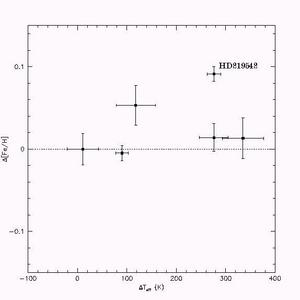Press Release - PLANETARY POLLUTION OF STAR CHEMICAL COMPOSITION
Rocky material of planetary origin falling on its parent stars and changing its chemical composition: this is the first result of the italian extra solar planet search project, in progress at Telescopio Nazionale Galileo (Canary Islands), using the high resolution spectrograph SARG. The targets are solar-type stars in wide binary systems (separation of a few hundreds of astronomical units). The study of chemical composition of the first six pairs has revealed one system (HD 219542) characterized by strong differences between the components. This is an unexpected result, since the two stars were formed together and they have not yet reached the evolutionary phases that cause abundance variations due to the mixing of material between internal and external regions of the star. The most likely explanation is that accretion of rocky material of planetary origin (a protoplanetary disk or rocky planets) has occurred. In fact, the chemical differences concern heavy elements only (like iron), while the abundance of light elements like carbon is not different in the two stars. The observed abundance pattern can be explained by the engulfing of about 3-4 Earth masses of rocky material. This result sheds new light on the debate concerning the chemical composition of the stars with planets (about 60 already known). Either planets formation is efficient only in stars with high content of heavy elements or is the planet formation process that alters the chemical composition of their parent stars. Our discovery favors the second scenario, indicating that accretion of elements of planetary material sufficient to change significantly the chemical composition of the stars might actually occur. Search for planets orbiting the components of HD 219542 as well as for the other stars in the sample is in progress. Rather long observing periods are required before drawing any conclusion concerning the occurrence of planets.
Run of the differences between the abundances obtained for the two components of each system with the difference in the effective temperatures adopted for the star.
The SARG Planet Search program is presented online
Research Group:
R. Gratton, R. Claudi, S. Desidera, S. Lucatello (Astronomical Observatory, Padua, Italy)
G. Bonanno, R. Cosentino, S. Scuderi (Astrophysical Observatory, Catania, Italy)
Contact: Dr. R. Gratton
Phone :+39 049 8293442


